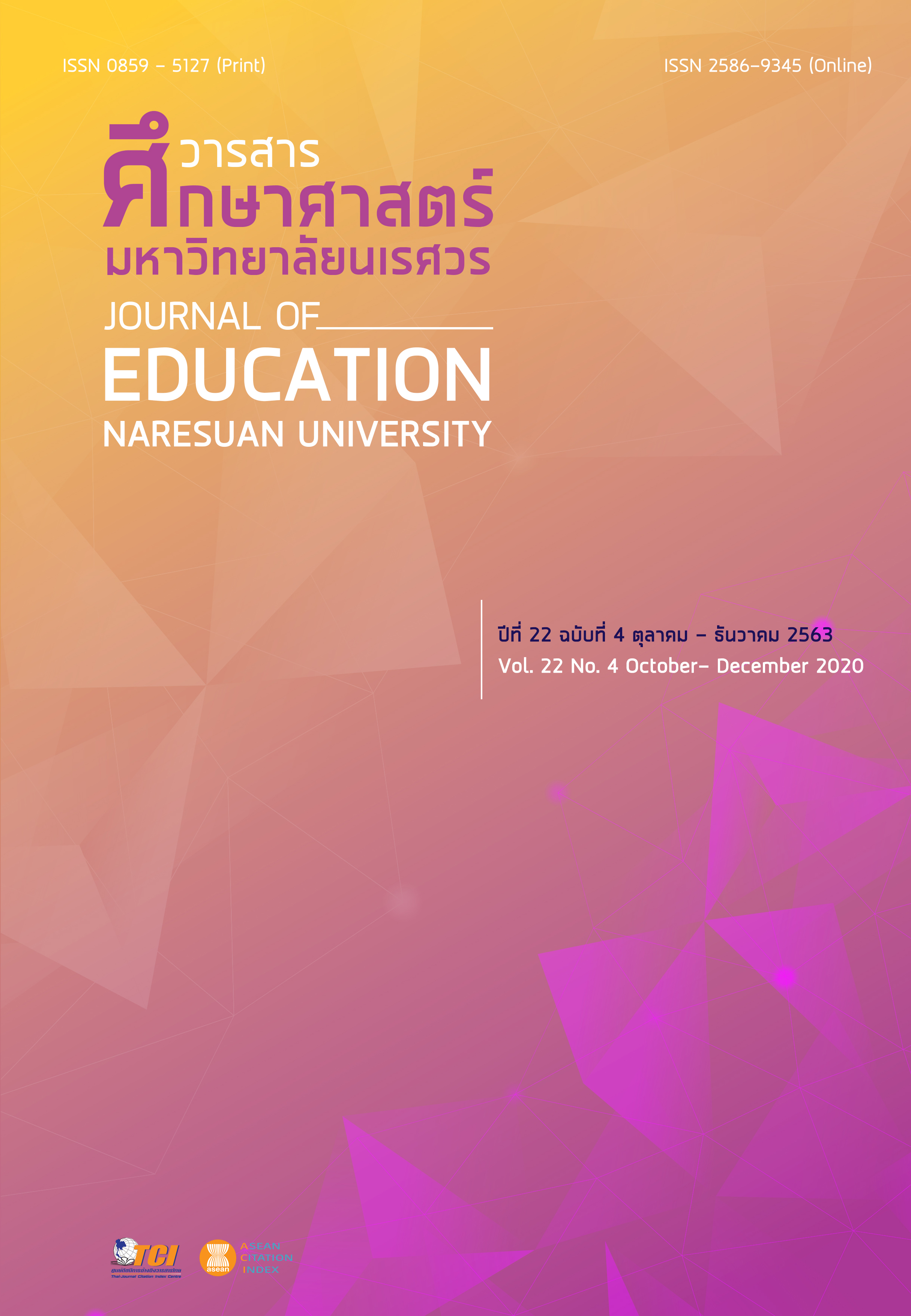THE EFFECT OF USING THINK-TALK-WRITE TECHNIQUE WITH PHASES-METHODS COMBINATIONS MODEL TO DEVELOP MATHEMATICAL REASONING OF MATHAYOMSUKSA III STUDENTS ON CIRCLE ผลของการจัดกิจกรรมการเรียนรู้โดยการใช้เทคนิค Think-Talk-Write ร่วมกับโมเดล Phases-Methods Combinations ที่มีต่อความสามารถในการให้เหตุผลทางคณิตศาสตร์ของนักเรียนชั้นมัธยมศึกษาปีที่ 3 เรื่อง วงกลม
Main Article Content
Abstract
The purpose of this study was to study the effect of using think-talk-write technique with phases-methods combinations model to develop students’ mathematical reasoning on circle. The sample of this study was 37 Mathayomsuksa III students who were selected by using cluster sampling, one classroom out of seven classrooms. The research instruments consisted of 10 lesson plans designed by using think-talk-write technique with phases-methods combinations model and the mathematical reasoning ability test. The data were analyzed by using descriptive statistics, which were frequency, percentage, mean, and standard deviation, and comparative statistics that is one-sample t-test. The results of the study revealed that most of students had mathematical reasoning ability at good and excellent levels. The hypothesis testing found that average score of students’ mathematical reasoning was higher than 18 (60 %) at the statistical significance of .05.
Article Details
The owner of the article does not copy or violate any of its copyright. If any copyright infringement occurs or prosecution, in any case, the Editorial Board is not involved in all the rights to the owner of the article to be performed.
References
Ariyathanapong, P., Promarak, P., & Suwannapho, P. (2016). The effects of cognitively guided instruction activities for grade 11 students on mathematical problem solving and reasoning ability for probability. Journal of Education Naresuan University, 18(4), 266 - 277. [in Thai]
Nikoloudakis, E. (2009). A proposed model to teach geometry to first-year senior high school students. International Journal for Mathematics in Education, 2, 17-45.
Phiromrat, S. (2012). Effects of using think-talk-write technique in organizing mathematics learning activities based on inquiry model on mathematical reasoning and communication abilities (Master thesis). Bangkok: Chulalongkorn University. [in Thai]
Sawekngam, W. (2014). Reasoning ability required for student in the 21st century. Journal of Education Chulalongkorn University, 42(2), 207 - 223. [in Thai]
The Institute for the Promotion of Teaching Science and Technology. (2003). Manual of mathematics assessment. Bangkok: Ministry of Education. [in Thai]
The Institute for the Promotion of Teaching Science and Technology. (2013). High school mathematics curriculum guide (revised version). Bangkok: Ministry of Education. [in Thai]
The Institute for the Promotion of Teaching Science and Technology. (2016). The result of TIMSS 2015. Bangkok: Ministry of Education. [in Thai]
Thipkong, S. (1990). Theories and method of teaching mathematics. Bangkok: Faculty of Education Kasetsart University. [in Thai]
Thongnak, P. (2016). The effects of organizing learning activities through heuristics with think talk write technique on mathematical problem solving and communication abilities of Mathayosuksa IV students (Master thesis). Chonburi: Burapha University. [in Thai]
Yodfai-in, K. (2013). Effects of organizing mathematics learning activities using phase-methods combinations model and strategies for advancing mathematical thinking on mathematical reasoning and visualization abilities of ninth grade students (Master thesis). Bangkok: Chulalongkorn University). [in Thai]


